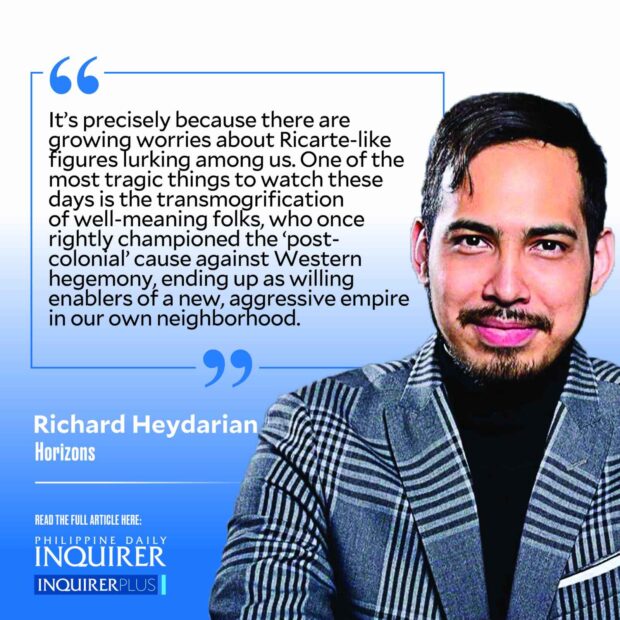The Ricarte tragedy: What is true patriotism?
 Decades after Gen. Emilio Aguinaldo surrendered to the Americans, and long after our finest ilustrados were laid to rest, one man refused to give up on our quest for national independence: Artemio Ricarte. The legendary veteran of the 1898 revolution not only refused to bend the knee to the new Western colonizers, but he even dared to continue fighting for a truly independent Philippines throughout the opening decades of the 20th century.
Decades after Gen. Emilio Aguinaldo surrendered to the Americans, and long after our finest ilustrados were laid to rest, one man refused to give up on our quest for national independence: Artemio Ricarte. The legendary veteran of the 1898 revolution not only refused to bend the knee to the new Western colonizers, but he even dared to continue fighting for a truly independent Philippines throughout the opening decades of the 20th century.
Years of exile in Guam, along with Apolinario Mabini, only hardened his determination to not take the oath of allegiance to America. While Mabini eventually succumbed upon returning to Manila, Ricarte faced permanent banishment by sticking to his patriotic convictions. As a result, he assumed the mantle of the “last revolutionary.”
Thousands of miles away from home, he plotted multiple uprisings against the new occupiers, most notably the so-called “Ricarte Fourth of July Plot,” which sought to mobilize labor unions to seize power at the heart of America’s sole Asian colony.
Thanks to his relentless patriotic passion, he earned the nickname “Vibora,” which also happens to be the title of one of F. Sionil Jose’s most-celebrated novels. Bereft of a standing army of his own, however, Ricarte constantly leveraged the prospect of potential intervention by a new rising power to encourage revolts back home.
Buoyed by decades of relentless industrialization following the Meiji Restoration, and a world-historical victory over czarist forces at the turn of the century, Imperial Japan was now seen as the de facto patron—and host—of Asian nationalists. It didn’t take long before Ricarte decided to move to the “land of the rising sun,” where he not only continued with his political passions, but also began to build a new life altogether.
With his new family, he ran a restaurant in Yokohama, while teaching Spanish in Tokyo. But just when everyone thought that the Philippines’ “last revolutionary” was going to fade into the dustbin of history, World War II upended everything.
Overlooking Imperial Japan’s fascist turn throughout the 1930s, and its vicious colonization of neighboring Korea and China, Ricarte accompanied the invading forces to establish a whole new regime in the Philippines. Unlike the local “collaborator” elite, he was willingly part of a monstrous project, which sought to portray Imperial Japan’s brutal occupation of his homeland as a form of “liberation.”
But unlike neighboring Indonesians and Vietnamese, where leading nationalist figures welcomed Japanese assistance against European overlords, the reception in the highly “Americanized” Philippines was totally different. Imperial Japan’s horrific atrocities against the Filipino people only reinforced public resentment against the new imperial power.
Perhaps Nick Joaquin best captured Ricarte’s tragic predicament: “He who had been of the Resistance now found the Resistance against him. He who was the Revolution now found himself the counter-revolution.”
Here was a man, who—encouraged by the promise of becoming a Japanese-sponsored president of a liberated Philippines—imagined himself as a “returning hero” and yet ended up “painted as a villain, the arch-plotter behind the sinister Makapili …”
Even his former colleagues, including Aguinaldo, now saw him as nothing but the manifestation of “a vindictive old man’s effort to ‘square accounts’ with those who had betrayed the [1898] Revolution.”
At this point, dear reader, you may have guessed why I have raised the case of Ricarte. Yes, it’s precisely because there are growing worries about Ricarte-like figures lurking among us. One of the most tragic things to watch these days is the transmogrification of well-meaning folks, who once rightly championed the “post-colonial” cause against Western hegemony, ending up as willing enablers of a new, aggressive empire in our own neighborhood.
Some have even gone so far as blaming not only Ukraine for defending itself against an invading Russia, but also our own patriots for defending our own sovereign rights in the West Philippine Sea. Ricarte’s tragic arc is a cautionary tale with a clear moral lesson: True patriotism is about distinguishing the wars of yesteryears, on one hand, and the real and present threats of our times, on the other.
It’s about keeping in mind historical injustices without losing sight of what is happening in front of you today. It’s about the intellectual courage to not only condemn the historical crimes of Western empires, but also resist contemporary threats posed by Eastern empires. That’s Filipino patriotism!
rheydarian@inquirer.com.ph




















